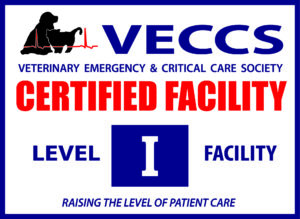Mass Vet Recertified As Level I Emergency & Critical Care Facility
We are proud to announce that Mass Vet has been recertified as a Level I veterinary emergency and critical care facility by the Veterinary Emergency and Critical Care Society (VECCS)! Level I hospitals must meet strict requirements for staffing, equipment and medical expertise.
 What does this all mean and why is it important?
What does this all mean and why is it important?
More information can be found here, but Level I is the highest rank a veterinary emergency and critical care facility can achieve. This certification represents a third-party verification by the Veterinary Emergency and Critical Care Society (VECCS) that Mass Vet meets the standards for their highest rating.
At Mass Vet and throughout the network of Ethos Veterinary Health hospitals, we work hard to ensure our doctors, technicians and client care team combine compassion and kindness with skills, expertise and advanced knowledge of our state-of-the-art diagnostic equipment. This certification speaks as much, or more, to their skills and dedication as it does to the technical and administrative aspects of running a 24-hour emergency and critical care hospital.
What are the Standards for a Level I Emergency and Critical Care Facility?
- The facility must be a 24 hour acute care facility with the resources and specialty training necessary to provide sophisticated emergent and critical patient care.
- The facility must be open 24 hours per day, 365 days per year.
- There must be a board-certified critical care specialist employed full time and available onsite or by phone 24/7. (At Mass Vet we have three full time critical care specialists!)
- Staffing:
- There must be at least 1 veterinarian, with a minimum of two years experience on duty (on site) at all times
- There must be at least 2 certified technicians employed full time, and it is preferred if at least one of the technicians is a Certified Veterinary Technician Specialist in Emergency and Critical Care.
- The facility must provide continuing education: A comprehensive written plan that includes a specific set of components must be in place.
- The facility must have a relationship with a board certified radiologist (onsite or via the internet) for the review of diagnostic images. At Mass Vet we have three full time board certified radiologists and four within the IVG network.
- A level 1 facility must have access to appropriate and timely consultation with veterinary specialists. As of today, Mass Vet has 24 board certified specialists in 10 different veterinary specialties and a culture of inter-specialty collaboration.
- Emergency Capabilities:
- The facility must have the equipment and staffing resources to evaluate and stabilize any small animal.
- The facility must be able to perform a variety of procedures including: mechanical ventilation, invasive blood pressure monitoring, endoscopy, bronchoscopy, abdominal ultrasound and echocardiography.
- In-patient Care – There is a long and detailed list of areas for in-patient care that a level I facility must be able to provide, among them:
- Provide patients with IV nutrition
- Perform procedures to address life-threatening problems
- Administer blood transfusions using natural and/or artificial blood products
- Provide advanced blood pressure monitoring and support
- Administer multi-modal pain management.
- Perform volume- or pressure-cycled mechanical ventilation
- Facilities:
- The facility has a system in place to provide continuous ongoing power to support critical equipment for an indefinite period of time in the event of a power outage. This includes, uninterrupted power to computers, phone systems, emergency lighting and a generator for long term power needs.